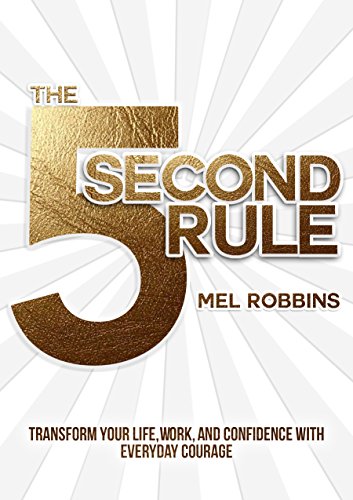Contrary to popular belief, confidence isn’t something that is given or that you’re born with. It has to be created and cultivated. And the sooner you start working on yours, the faster you’ll notice the dramatic change in your life.
Being confident at work leads to an amazing side effect, which is getting noticed more. Want to be known for your impeccable manners? Unshakeable self-assurance? Receive praise from your boss and colleagues? Keep reading!

The 5 Second Rule
by Mel Robbins
⏱ 15 minutes reading time
🎧 Audio version available
Cut the Self-Deprecating Humor
Everyone seeks perfection. But, truth be told, it’s impossible achieve, never mind maintain. Adding to that, failure can also make you feel anxious and socially unaccepted. Occasionally, you might try to escape those feelings by being self-deprecating.
While there is no harm in laughing at yourself every once in a while, adopting self-deprecating humor that constantly makes jabs at your confidence will eventually affect you. Think about this: would you rather present yourself as a confident, capable person or as someone who constantly downplays their intelligence or ideas?
At the moment, this sense of humor may seem innocent, but what you are doing is showing others that you see yourself as lacking– whether in confidence, relevant experience, or whatever. Which encourages others to do the same.
Also, Cut the Negative Self-Talk
If you shouldn’t talk bad about yourself to others, then it only makes sense that you should cut the negative self-talk too. You’re never going to get noticed– for the right reasons– if you are constantly beating yourself up.
Be kind to yourself. This positive mindset of not punishing yourself will boost your confidence.
Notice how much you talk down to yourself. Do you often find yourself backing away from expressing an idea because you believe someone else must be better qualified? Do you find yourself making excuses for everyone but yourself?
All you’re succeeding in doing is placing unnecessary limitations on yourself. When you start encouraging yourself, it shows. It will show in the way you behave after making a mistake. It will show how much you contribute to meetings. It will even show in the language you use to express yourself.
Increase Your Knowledge
Want a bullet-proof way of getting noticed at work and effortlessly become more confident? Be a well of knowledge. People trust those who exhibit extensive knowledge. They’ll come to you with questions; you’ll be the go-to person for settling debates, and hey, if nothing else, it’s a great way to keep the conversations flowing.
So read up on the latest research and information in your relevant field. Brush up on trivial knowledge. Start digging into the hows and whys of processes in your work, which in turn will boost your confidence in your own ability to do them.
Put Thought Before What You Say and How You Say It
We often rush into answering questions, especially if a superior is the posing the questions, but that can result in stumbling over your words, forgetting important information, and compensating with filler words, such as an endless stream of “ums” and “likes.”
Your word choices change the way people interact with you. For example, when trying to interject a conversation, instead of apologizing, alternatives such as “excuse me” and “thank you” work much better. Don’t hesitate or show your hesitance by easing into an idea pitch, for instance, by saying “I feel like…” Assert your confidence right away by saying “This will…” and continue.
Put thought into what you’re going to say before you say it, and then plan how you are going to say it. For example, you want to speak in a clear, level voice — not too loud and definitely not too low. Your words should be chosen carefully and deliberately– no fillers if possible.
Lastly, you want to put considerate thought into your body language– this is, by the way, one of the most important parts in getting noticed at work and presenting yourself as confident. For a more detailed guide and some unforgettable tips, stay tuned!
Wonder Woman or The CEO?
The CEO is a power pose and a prelude for how you’re going to exude confidence and self-assurance before you know it!
Body language is, hands down, one of the most important aspects to get right at work. People place a lot of value on first impressions. If they see you with slumped shoulders, dragging your feet, their first impression isn’t going to be impressive.
So, body language tricks! Always make a point to hold eye contact when someone is speaking to you. You want to show them, especially if you’re talking to your boss or superior, that you’re paying attention to what they say.
Smiling more needs no explanation. The act of smiling can boost your confidence, believe it or not! It releases an abundance of all those feel-good hormones, so your body can’t help but feel confident.
Now, let’s talk about posture and pose. Striking a confident pose tricks your body into believing you are confident.
Have you heard of the CEO pose or the Wonder Woman pose?
Both are power poses– ones that make you feel and exude confidence. Even the act of practicing them preps you before, for example, a big meeting. The Wonder Woman pose is standing with your back impeccably straight, your legs slightly spread, and your hands on your hips. This pose thrusts your chest forward slightly, boldly showing your confidence. So, take a minute or two before a meeting, before even going to work, and assume a power pose.
The CEO pose is one you have to be cautious with, but boy, is it a confidence booster! Sit at your desk, prop your feet on the desk, and place your hands behind your head.
Try your hand at The Performer to get an adrenaline rush. Named after the Rolling Stones’ Mick Jagger, this power pose involved putting both hands over your head and standing with your feet apart.
The expert on power poses, Amy Cuddy, whose TED Talk on power posing and its power has millions of views, named this next pose– The Loomer– after Lyndon B. Johnson, who famously used his 6’4’ height to strategically show he was in control during meetings.
What are you waiting for? Strike a pose, and you’ll feel like a regular Don Draper!
Be Mindful of Your Body Language
Power poses aren’t all there is to controling your body language. There are a million things you can do to stand out in a room.
For one thing, there is absolutely nothing that says “confidence” like making eye contact– and it’s not just psychologists who say so. Even former U.S. Secret Service agents, like Evy Poumpouras, agree. Poumpouras says that confident people don’t shy away from eye contact.
So when you speak, look at people. And even more importantly, look at people when they speak. It goes beyond appearing self-assured. It shows your co-workers and colleagues that you are actively listening. For you, it sends the signal that you’re beyond sure of yourself and your abilities.
Use Your Voice
Your boss is never going to notice your extraordinary skills if you never speak up about them.
One of the factors that often hold people back from speaking up is fear. Fear can be crippling, and it holds you back from speaking up when your boss calls you in, in meetings, or in regular conversations. As a result, you end up being seen as someone who doesn’t contribute or is too quiet. People are never going to learn why you’re so unique and talented if you never allow them to see it.
If speaking up is outside of your comfort zone, maybe it’s time to consider leaving that bubble altogether. There is no confidence killer like staying in your protective comfort zone. Take it one step at a time. Make a thoughtful suggestion in a meeting. If you see someone who needs help, try contributing without being asked.
And here’s an final tip: don’t be afraid to ask questions. For some reason, there’s a misconception that asking questions or for help is a weakness, a sign that you’re not confident in your abilities. However, that couldn’t be further from the truth. Is the alternative of doing a task incorrectly better than asking for help?
That’s only going to get you noticed for the wrong reasons. Better to show initiative and ask for clarification. If you’re unsure, ask someone else what you need to do and learn from that experience. All right now, ready to show them what you’ve got?
What Is Snapreads?

With the Snapreads app, you get the key insights from the best nonfiction books in minutes, not hours or days. Our experts transform these books into quick, memorable, easy-to-understand insights you can read when you have the time or listen to them on the go.


